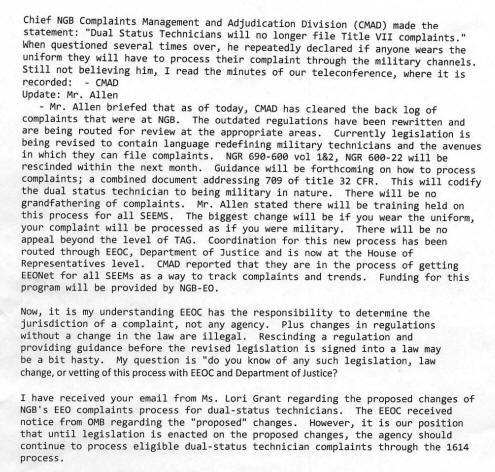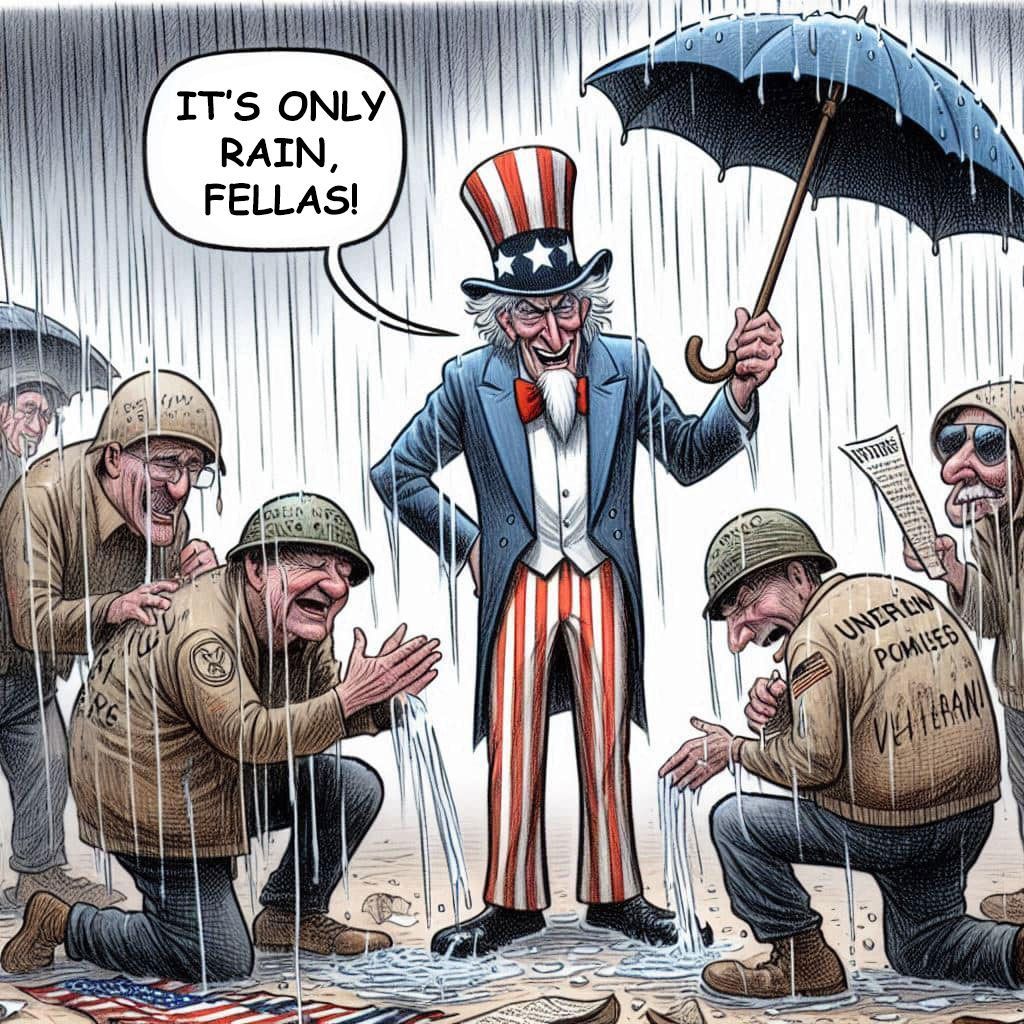NGB Decides It's Easier to Change the Law than to Actually Follow It
Ben Banchs • April 9, 2020
Attempts to Strip Away Equal Employment (EEO) Protections from Military Technicians
New Orleans, LA (May 4, 2013) - At a time when the US Air Force is coming under fire because a top General used his legal discretion to overturn a jury conviction of sexual assault against a fellow officer, it would seem odd that another branch of the DoD would be thinking of doing anything but enhancing protections against sexual harassment and assault, and other workplace violations. Right? Wrong. The folks at the National Guard Bureau (NGB) are working hard to do just that, deny Dual Status Technicians the ability to have complaints heard by the Equal Employment Opportunity Commission (EEOC).
Dual-status technicians are the backbone of the full-time National Guard workforce. The majority of technicians work in the maintenance field, although some serve in administrative roles. For the most part, these are the folks that keep fighter planes in the air, make sure tanks are rolling, and ensure helicopters are flying. They are the first ones to respond to hurricanes, fires, floods, you name it. Whenever you see National Guardsmen on TV responding to some event or natural disaster you can rest assured the majority of them are full-time technicians.
There are approximately 52k of these men and women working throughout the 50 states, 3 territories, and the District of Columbia. They are all Civil Servants and, for the most part, are paid just like any other civilian employee of the Federal government. However, in order for a technician to retain their civil service job they must maintain concurrent military membership in either the Army or Air National Guard, and if they lose this military membership then they also lose their civilian job. This hybrid status causes many problems for these employees. For example, the law requires that they wear the uniform of their respective military component to work everyday, even though they are paid and administered as Federal civilians. They also work side-by-side with Active Guard and Reserve (AGR) individuals, who are essentially the Reserve version of active duty personnel, and who (by and large) earn much more per year than their technician counterparts do for, basically, the same job and work requirements.
Along with all the mixes of statuses, and the confusion that is caused by a civilian having to wear a military uniform to work everyday, their right to due process is just as confusing and often abused by their leadership structure. For the most part it lacks any real substance because most of the complaint resolution avenues end with the Adjutant General, the state's highest military official, and the one legally deemed to manage and administer the technician program in each state. The Adjutant General's decision on a matter cannot be reviewed nor overturned by anyone, not even a Federal Court, so the opportunity for abuse is there for the taking, especially since the Adjutant General also controls who gets hired, who gets promoted, who gets fired, you get the picture. So, even in the few instances where an employee has the ability to bring forth a complaint, they are reluctant to because of the real possibility of reprisal. If you file a complaint as a civilian there is a real possibility that you can get kicked out of the military side of the house. Since you have to be in the military to keep your civilian job, once they kick you out of the military your cease to be a civilian employee, and viola...no more complaint, no more "problem employee." This extends to almost all areas of employment including discipline, performance, etc., except for one: Equal Employment Opportunity.
While technicians are currently barred from being heard by the Merit Systems Protection Board (MSPB) in cases of discipline, performance, retaliation and whistleblower (yes, even in retaliation and whistleblower cases), technicians are still afforded the right to have equal employment-type complaints be adjudicated and processed by traditional EEO methods, and even heard by the full Commission. That is, unless NGB has any say in the matter.
Even though technicians, legally, have the right to file EEO complaints, the National Guard does a horrendous (some would even say criminal) job of handling complaints properly. They mislead and coerce employees, almost on a daily basis, to discourage them from availing themselves of their legal right to due process. If an employee actually files an EEO complaint, the National Guard always muddies the waters and tries to convince EEO agents that since the employee is a "military technician" then all their complaints should be considered "inherently military in nature" and thus not able to be heard by the EEOC. The National Guard has been doing this for a long time and they are often successful in having complaints dismissed, and eventually having the employee dismissed, as well, without any fear of having to answer for its misdeeds.
But, as successful as they are at denying technicians their EEO rights, they do lose sometimes, and they lose BIG! Take the case of Theresa Devine vs. NGB, for example. Mrs. Devine was a technician who filed a complaint against the National Guard for sexual harassment. The circumstances surrounding her complaint were truly disappointing. She was repeatedly propositioned for sex in the most explicit of ways by coworkers, and was harassed to the point of being sent flowers to her house with sordid proposals. She filed a complaint in October of 2010, and the National Guard did what it always does...nothing. The case made it all the way to the EEOC, and they issued a default judgment against NGB for their gross mishandling of the case, and for repeatedly ignoring their duties under the law.
The Commission's ruling read, in part, "the Agency was warned that it could face sanctions for failure to complete an adequate investigation in this case. Nonetheless, the Agency produced an incomplete investigative file...that did not include affidavits, except those (Devine) supplied herself...The complaint file the Agency produced was incomplete because the Agency never undertook any investigation of the case...Other than the reasons set forth in the (Agency's) Motion to Dismiss, most of which were rejected..., the only reason the Agency gave for this failure was that this was (Christopher) Martin's first civilian Formal Complaint, implying that he was unfamiliar with the civilian side EEO procedure."
Christopher Martin was (at the time) and still is (to our knowledge) the State Equal Employment Manager (SEEM) for the District of Columbia National Guard (DCNG). The ironic part is that Mr. Martin has been hailed as somewhat of a subject matter expert (SME) when it comes to EEO complaints not just within the DCNG, but also in other states such as California. His "expertise" and "advice" has been relied upon on numerous occasions over the last few years.
Martin was also involved in a subsequent case that ended in a default judgment for another DCNG technician. See Vikki L. Rouleau v. NGB. Once again, Rouleau was repeatedly sexually harassed by a co-worker, and when she finally met with Martin, he failed to inform the her of her rights to file an EEO complaint. Clearly there's a patter of either incompetence or willful ignorance and misapplication of the law.
Sadly, the above narrative is par for the course when it comes to technician EEO complaints in the National Guard. What's even sadder is that not only does NGB wipe their proverbial butt with the EEOC Compliance Manual, they always seek to dismiss technician complaints saying they are ALL military in nature. The problem is that they don't attempt to address the problems in that venue, either. It would be one thing if NGB told the EEOC "hey, we think this is a military issue, and we will deal with the problems, accordingly, in that venue," and then actually took affirmative action to correct these types of behaviors. In reality, NGB's only goal is to just make the problem (the employee) go away, save face, and protect the Adjutant Generals and their coffers. Seldom, and I mean seldom does justice truly get served. In light of all this one would think NGB would be hard at work to identify problems with its enforcement of EEO laws...wrong.
LIUNA was recently asked to provide our comment and input regarding a proposal to change Federal law that was being floated about for possible introduction into the FY14 National Defense Authorization Act (NDAA). The language reads as follows:
SEC. ___. FORUM FOR PROCESSING OF COMPLAINTS OF WRONGFUL DISCRIMINATION BY NATIONAL GUARD MILITARY TECHNICIANS (DUAL STATUS).(a) IN GENERAL - Section 709 of title 32, United States Code, is amended by adding at the end the following new subsection:"(j) A complaint of wrongful discrimination by a person employed under subsection (a) who is a military technician (dual status) and otherwise subject to the requirements of subsection (b) shall be considered a complaint of wrongful discrimination by a member of the armed forces."(b) EFFECTIVE DATE-The amendment made by subsection (a) shall apply with respect to a complaint of wrongful discrimination initiated on or after the date of the enactment of this Act.
We didn't know, definitively, that NGB was proposing the legal change, but we had our suspicions. In any event, we signaled our tentative opposition in order to do more research. Our immediate concerns were that we do not want to push the technician program any further towards the military than it is already. If we were to agree to this we would do our members a disservice and we would be going away from what we're trying accomplish with our tech equity legislation. Technician complaints that are based on purely civilian issues need to be dealt with thru the currently available due processes accessible to all other Federal employees. If we subject technicians to yet one more military proceeding we're regressing not progressing. Plus, it'll just be one more complaint process that has no further review outside of the military chains. In short, we did not want to support this provision.
A few days later we received an anonymous email with a very interesting attachment (see images below).
Now it became clear why the language was being proposed, and by whom. LIUNA's initial reaction after reading this email excerpt was disgust. With it's troubled history of trampling on employee rights, and it's sheer inability to do the right thing, NGB sunk to a new low. They finally decided that it was easier to change the law than to follow it, plain and simple. If they strip EEO rights away from technicians they, effectively, get rid of the last semblance of due process available. They would give Adjutant Generals complete authority over all workplace-related complaints, and you would see the end of what little justice there may be left within the ranks of the National Guard. Not on our watch.
LIUNA put together a comprehensive document outlining why we're opposed to this legislative proposal, and we submitted copies to both the House and Senate Armed Services Committee. We will make sure that this legislation doesn't even see the light of day, and we will continue to fight to allow technicians the right to have their complaints heard beyond the level of the Adjutants General.
Share Via Other Platforms
More News







